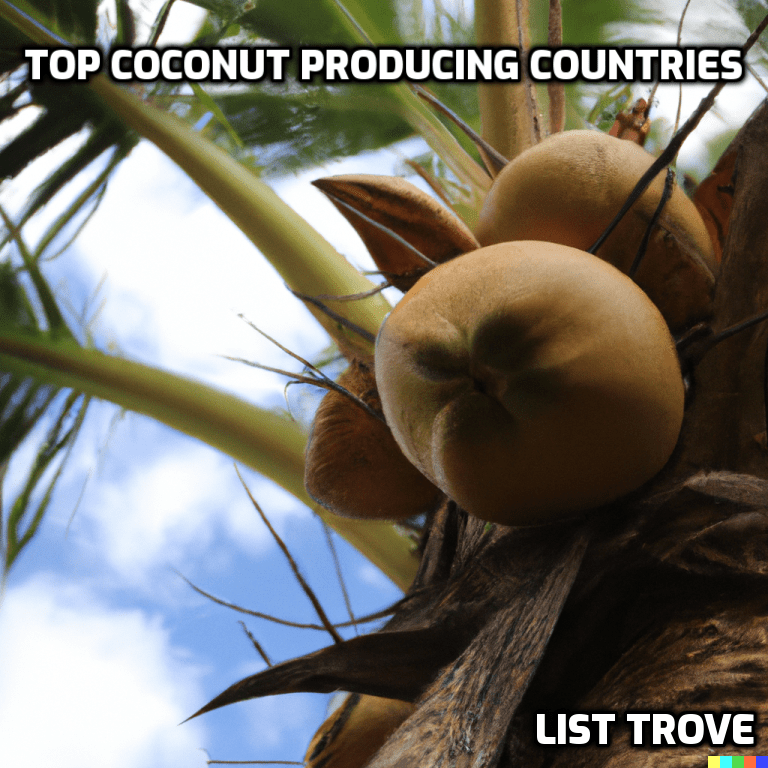Coconuts have been a staple food and commodity in tropical regions for centuries. They are used in a variety of ways, from cooking to cosmetics, and even in medicine. But which countries produce the most coconuts? We will explore the top 10 coconut producing countries in the world and the role coconuts play in their economies.
- Indonesia: Indonesia is the world’s largest producer of coconuts, with an annual production of over 19 million metric tons. The country’s coconut industry employs millions of people and contributes significantly to its economy. The coconut palm is known as the “tree of life” in Indonesia, as every part of the tree is utilized, from the leaves to the trunk.
- The Philippines: The Philippines is the second-largest producer of coconuts in the world, with an annual production of over 15 million metric tons. The coconut industry is a major source of income for the country, providing livelihoods for millions of farmers and their families. The country’s love for coconuts is reflected in their cuisine, with coconut milk and oil used in many traditional dishes.
- India: India is the third-largest producer of coconuts in the world, with an annual production of over 10 million metric tons. Coconuts are grown across the country, from the southern states of Kerala and Tamil Nadu to the western state of Maharashtra. Coconut cultivation is a major source of income for farmers in India, and the country is also a leading exporter of coconut products such as coconut oil and desiccated coconut.
- Brazil: Brazil is the fourth-largest producer of coconuts in the world, with an annual production of over 2.8 million metric tons. Coconut cultivation is mainly concentrated in the northeastern states of Bahia and Sergipe, where the climate is ideal for growing the crop. Brazil’s coconut industry is known for its sustainable practices, with many farmers using agroforestry systems to grow coconuts alongside other crops.
- Sri Lanka: Sri Lanka is the fifth-largest producer of coconuts in the world, with an annual production of over 2.5 million metric tons. The country’s coconut industry is a major source of employment and income for rural communities, with over 12% of the population involved in coconut cultivation. Sri Lanka is also known for its high-quality coconut products, including virgin coconut oil and coconut flour.
- Thailand: Thailand is the sixth-largest producer of coconuts in the world, with an annual production of over 1.8 million metric tons. The country’s coconut industry is concentrated in the southern regions, where the climate is warm and humid. Coconuts are used extensively in Thai cuisine, with dishes such as tom kha gai (coconut milk soup) and green curry made with coconut cream.
- Mexico: Mexico is the seventh-largest producer of coconuts in the world, with an annual production of over 1.6 million metric tons. Coconut cultivation is mainly concentrated in the southern states of Guerrero and Oaxaca, where the crop is grown alongside other tropical fruits such as mangoes and papayas. Mexico is also a major producer of coconut oil, which is used in many traditional dishes such as mole sauce.
- Papua: New Guinea Papua New Guinea is the eighth-largest producer of coconuts in the world, with an annual production of over 1.5 million metric tons. The country’s coconut industry is mainly focused on small-scale farmers, who grow coconuts alongside other crops such as cocoa and coffee. Coconut products such as copra and coconut oil are major export commodities for the country.
- Vietnam: Vietnam is the ninth-largest producer of coconuts in the world, with an annual production of over 1.4 million metric tons. The country’s coconut industry is mainly focused on the southern regions, where coconuts are grown alongside other crops such as rice and coffee. Vietnam is known for its sweet coconut candies, which are made with coconut milk and sugar.
- Tanzania: Tanzania is the tenth-largest producer of coconuts in the world, with an annual production of over 1.3 million metric tons. The country’s coconut industry is mainly focused on the coastal regions, where the climate is ideal for growing the crop. Coconut products such as coconut oil and coconut water are major export commodities for Tanzania, and the industry provides employment for thousands of people.
Coconut is a nutritious and versatile food that provides a range of vitamins, minerals, and other beneficial compounds.
Here are some of the key nutrients found in coconut:
- Healthy Fats: Coconut is high in healthy saturated fats, including medium-chain triglycerides (MCTs), which have been shown to improve brain function and promote weight loss.
- Fiber: Coconut contains both soluble and insoluble fiber, which can help support digestive health and prevent constipation.
- Vitamins and Minerals: Coconut is a good source of several vitamins and minerals, including vitamin C, folate, potassium, and magnesium.
- Antioxidants: Coconut contains antioxidants such as phenolic compounds, which can help protect against oxidative stress and reduce inflammation in the body.
- Protein: Coconut also contains a small amount of protein, which is important for muscle maintenance and repair.
Coconut is a nutrient-dense food that can provide many health benefits when included as part of a balanced diet.
Coconuts are an important crop for many countries around the world, providing employment and income for millions of people. The top coconut producing countries in the world are Indonesia, the Philippines, India, Brazil, Sri Lanka, Thailand, Mexico, Papua New Guinea, Vietnam, and Tanzania. Each of these countries has a unique coconut industry, with different cultivation methods, products, and uses for coconuts. Whether it’s in cooking, cosmetics, or medicine, coconuts continue to play a vital role in many aspects of our lives.

